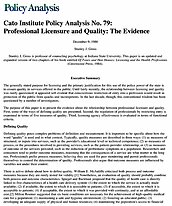The generally stated purpose for licensing and the primary justification for this use of the police power of the state is to ensure quality in services offered to the public. Until fairly recently, the relationship between licensing and quality was rarely questioned; it appeared self-evident that conscientious restriction of entry into a profession would result in protection of the public from quacks and incompetents. In the last decade, though, this conventional wisdom has been questioned by a number of investigators.
The purpose of this paper is to present the evidence about the relationship between professional licensure and quality. First, some of the ways of defining quality are presented. Second, the regulation of professionals by restricting entry is examined in terms of five measures of quality. Third, licensing agency effectiveness is evaluated in terms of functional criteria.
About the Author

This work is licensed under a Creative Commons Attribution-NonCommercial-ShareAlike 4.0 International License.
